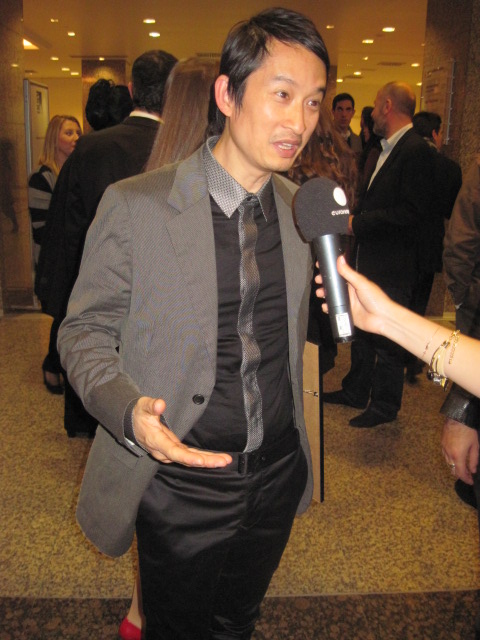|
|
||
|
Pro Tools
FILMFESTIVALS | 24/7 world wide coverageWelcome ! Enjoy the best of both worlds: Film & Festival News, exploring the best of the film festivals community. Launched in 1995, relentlessly connecting films to festivals, documenting and promoting festivals worldwide. Working on an upgrade soon. For collaboration, editorial contributions, or publicity, please send us an email here. User login |
Istanbul Film Festival
The largest, most established and most influential film event in Turkey, the Istanbul Film Festival has over the past 30 years, presented Istanbul audiences with a total of more than 3,250 films, showcasing the cinema of 103 countries, and attracting a total audience number of 3,150,000. With an audience of 150,000 in 2011, it is also considered the biggest Turkish film festival. Established in 1982 as a film week, and accredited by FIAPF in 1989, the Festival aims at encouraging the development of cinema in Turkey and promoting films of quality in the Turkish market. As such, the Festival incorporates the Meetings on the Bridge platform, and within the frame of this programme, a competitive Feature Film Project Development Workshop that was initiated in 2008, and a Work-in-Progress sidebar in order to support the Turkish film industry and Turkish film professionals. In 2015, the MoB began to accept submissions from neighbouring countries. The Istanbul Film Festival features an International Competition (limited to films on arts and the artist or literary adaptations) with a monetary award of a total of €25,000 as its grand prize the Golden Tulip. Showcasing Turkish cinema as the most active promotional, international platform in Turkey, the Festival features a National Competition, A National Documentary Competition, and a Human Rights in Cinema competition endorsed by the Council of Europe. The festival each year screens around 200 feature films, and takes place in April.
 Interview with Edgardo Cozarinsky at Istanbul Film FestivalAn Argentine Istanbul writer… Memories of a lovelorn man, walking around Buenos Aires after a break up, unites with memories of world and cinema history. Poems praising the night are the music of the film. Screened within the “Challenging the Years” section of the Festival, Nocturnos addresses the audience on the point where literature and cinema come together. It is just like a sweet dream that leaves a short and temporary taste behind. Istanbul streets continue to inspire Edgardo Cozarinsky who answers questions of the audience at film screenings.
- You bless the night in your film. Many writers and poets are inspired from the “night”. Does Nocturnos originate from your experience as a writer? I have always been attracted by the night since I was a child, because it was the forbidden part of the day. When the night fell, I had to be at home. And I always had the feeling that there were interesting things happening somewhere and I missed them. And when I grew up, I had the chance to explore and noticed that some people were people of the night and some were people of the day. Then I had not developed the idea much. It’s only recently that it came back. When you are an adult, you don’t think much about your childhood and youth. There are other more interesting things. And with age, things come back. Five years ago, I made a film called Night Watch which was about the night, a young drug dealer and a prostitute. It is a fascinating world because it is full of unknown dangers. And on the other hand, I wanted to do something more poetic and lyrical. Then this film came about. - There are references to a lot of writers. Where do we see your sentences? I wrote only the beginning, the end and the statement of the woman in the cafe “There are people of the day and people of the night.” Those three bits are mine. Other than those parts, there are references to Robert Frost, Borges, Alfredo Le Pera, Bertolt Brecht, Novalis, Hölderlin, and Xavier Villaurrutia. - Nowadays I’m reading a Turkish book which says: “When you are awake at night, you have two abilities: Vitality and remembrance.” Within these terms, being awake at night coincides with remembrance contrary to forgetting. Remembrance is also common in your film. Yes. The past somehow is like a permanent tattoo. With the images I projected onto the city walls, I wanted to express this. On the videos, I emphasised personal and social violence, and personal and collective memory. I wanted to combine images from different periods. I used two silent films, one of which is a Russian film in which the police attack workers. The story is not specific to Buenos Aires. For example, you see the bombing of Madrid in 1937. At the end, there is a woman who says she carries the memory of things she has not gone through. I feel that very much also. What my parents, my grandparents told me about the past is a part of my inherited memory. - Apart from night and memory, you bless “love” in the film. What do you think: Is this film about an unforgettable love for you? The letter that was burnt and torn comes to life in the film. I think there are some things that you cannot put away in your life. I do not see it in psychological terms; I think of it in emotional terms. I think there are things that live with you forever. That’s why I quoted the words at the end: “The past is not dead. It is not even past.” - From Godard? It’s not only from Godard. I learned later that Godard quoted it from W. Faulkner. - Cinema has a very different language and creative process from literature. How do you exist in cinema as a writer? Literature requires loneliness. You shoot the door to the exterior world and you listen to the voice inside of you. But I also like to be surrounded by people. That is how I make films. Because you have to convince people, you have to get what you want and you have to be active and social. These two different creative processes address different features inside me. That’s how I balance the two arts. - Does your main character reflect you? The main character is not me but you cannot prevent directing your feelings to your character. Especially when you deal with actors, you start having an intimate and deep relation with them. Because you talk to them about the characters and about how they feel. What you are telling them somehow always comes from you. - You were away from Buenos Aires for a long time. Have you thought about this place always? Have you fulfilled your longing to Buenos Aires now? It is also something that came back with the years. With age, you want to return to your roots. I left from Buenos Aires when I was 30 and came back years later. I realized that there are things that keep me moving, working and inspired. I feel lots of nourishment there. This is not nostalgia; I’m not into nostalgia at all. - You have many friends who are writers. You had collaborated with Susan Sontag. Is she a person you have inspired from? For example in terms of looking at others’ pains... We met in Paris in 1970. We became friends in America. It is very interesting that after she died we became close friends with her son. The arguments she raises about photography, about looking at the pain of others in photography, and illness are inspiring. But they are not inspiring for me. What inspires me is emotions rather than intellect. Even writers and poets from the previous century... - I suppose you don’t follow contemporary works in cinema? I watch old movies only. They give me more life. I haven’t followed current Turkish cinema. I remember that I was immensely impressed by Yılmaz Güney’s film Yol. - You have been to Istanbul before. Does any one of your stories take place in Istanbul? Yes, the story “El idolo de Beyoglu” in Three Frontiers is about a man who remembers his past in Istanbul. I constructed that character from my own memories and feelings of the city. I may someday write about Istanbul. I have some ideas about the similarities between Istanbul and Lisbon. The old and the new are very close to each other. You have new buildings next to old buildings. It’s extraordinary that the present and the past are side by side. I also went to Izmir while I was shooting a film about Henri Langlois, creator of the French Cinematheque. And I went to Izmir to learn that nothing remained of from the great fire. Izmir is very different from Istanbul. It’s like other Mediterranean cities, like Beirut. When the day comes to an end and the sun goes down, you are in a cafe and you don’t feel like going away. You smoke nargile (hookah) and feel that the time goes by very slowly... Interview and photographs: Ceyda Aşar 07.04.2012 | Istanbul Film Festival's blog Cat. : Alfredo Le Pera America Beirut Buenos Aires Buenos Aires Dealer Edgardo Cozarinsky Edgardo Cozarinsky Entertainment Entertainment Geography Government Henri Langlois Human Interest Human Interest Istanbul Izmir Lisbon Madrid Mediterranean Memory Paris Place of birth missing Robert Frost Susan Sontag Turkish Cinema War War writer Xavier Villaurrutia PEOPLE
|
LinksThe Bulletin Board > The Bulletin Board Blog Following News Interview with EFM (Berlin) Director
Interview with IFTA Chairman (AFM)
Interview with Cannes Marche du Film Director
Filmfestivals.com dailies live coverage from > Live from India
Useful links for the indies: > Big files transfer
+ SUBSCRIBE to the weekly Newsletter DealsUser imagesAbout Istanbul Film Festival The most comprehensive and oldest international film festival in Turkey. Established in 1982, it screens more than 200 films of various genres, and has an extensive Turkish features showcase. The Golden Tulip Grand Prize of the Festival has a monetary award attached. View my profile Send me a message The EditorUser contributions |




























